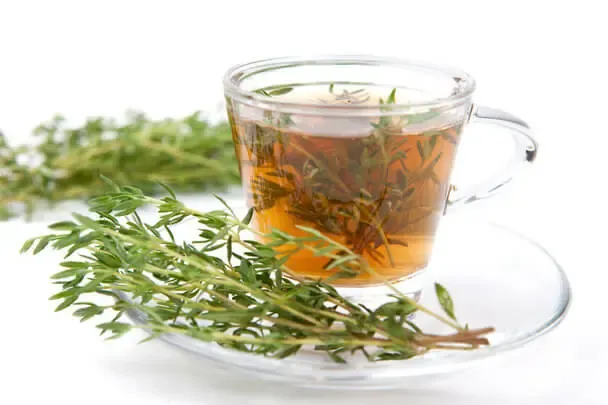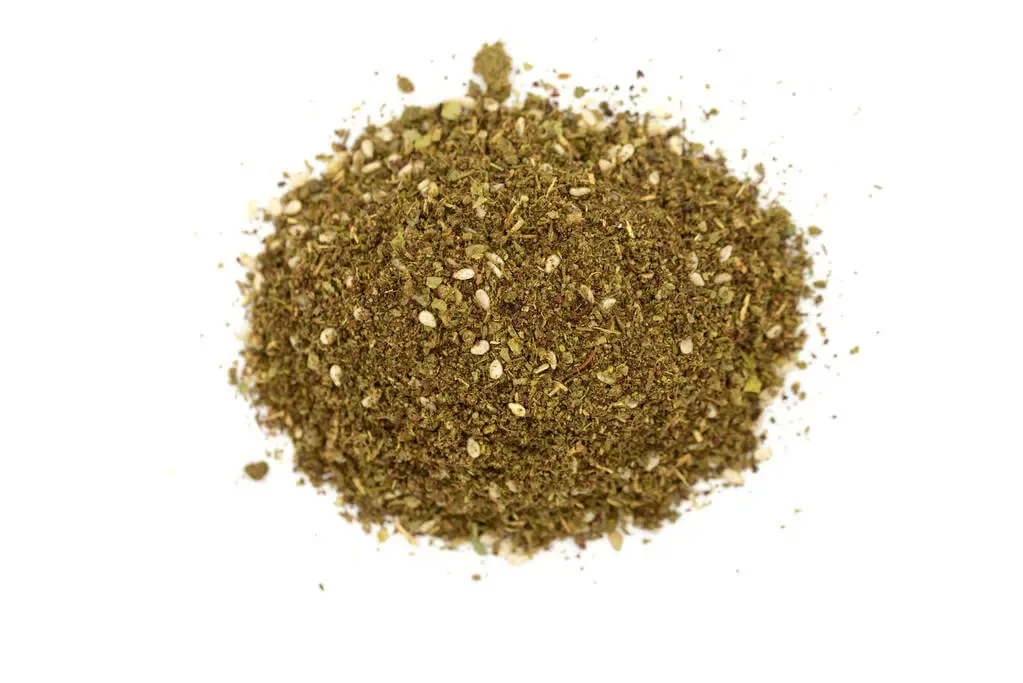What is Zaatar Tea?
Zaatar tea is a traditional Middle Eastern herbal tea made from a blend of dried zaatar leaves, thyme, and other aromatic herbs. This flavorful tea has been consumed for centuries due to its numerous health benefits and unique taste. The combination of these herbs gives zaatar tea a distinctive aroma and a slightly tangy flavor.
It is commonly consumed as a hot beverage and is often enjoyed with breakfast or as an afternoon pick-me-up. In addition to its delicious taste, zaatar tea is also known for its potent medicinal properties.
It is rich in antioxidants, vitamins, and minerals, which can help boost the immune system and fight off infections and illnesses.
Furthermore, zaatar tea has been shown to have anti-inflammatory and antimicrobial properties, making it an excellent natural remedy for various health conditions.
Benefits of Drinking Zaatar Tea
Zaatar tea is not just a delicious beverage, but it also offers a wide range of health benefits. Drinking this herbal tea can help boost your immune system, improve skin health, strengthen your bones, increase circulation, and clear out respiratory tracts.
One of the key benefits of zaatar tea is its ability to enhance the immune system. It is rich in antioxidants, such as flavonoids found in sumac, and thymol and carvacrol found in thyme and oregano. These antioxidants help to strengthen the immune system and protect the body against infections and illnesses.

In addition, zaatar tea can improve skin health. The antioxidants present in the tea aid in fighting free radicals that can damage the skin and accelerate the aging process. Regular consumption of zaatar tea can help improve skin elasticity and reduce the appearance of wrinkles and fine lines.
Another benefit of zaatar tea is its ability to build strong bones. It contains essential minerals like calcium and zinc, which are necessary for maintaining healthy bones and preventing conditions such as osteoporosis.
The tea also aids in increasing circulation throughout the body. Improved blood circulation ensures that essential nutrients and oxygen reach different parts of the body, promoting overall health and vitality.
Furthermore, zaatar tea can clear out respiratory tracts, making it beneficial for individuals suffering from respiratory conditions like coughs, colds, and asthma. The tea’s soothing properties help to reduce inflammation and alleviate congestion, making it easier to breathe.

Drinking zaatar tea regularly can also provide a boost of energy and improve mood. Its refreshing aroma and taste can invigorate the senses and help combat fatigue and low mood.
Moreover, zaatar tea has been found to aid memory and cognitive function. The tea contains certain compounds that can enhance brain health and improve memory retention.
Lastly, zaatar tea has been studied for its potential in treating chronic diseases. Some research suggests that the tea’s antioxidant and anti-inflammatory properties may have a positive impact on conditions such as cardiovascular disease, diabetes, and certain types of cancer.
To enjoy the numerous health benefits of zaatar tea, simply steep a tea bag or a teaspoon of zaatar in hot water for a few minutes. Add honey or lemon for taste if desired. Incorporate this herbal tea into your daily routine and experience its remarkable effects on your overall well-being.
Anti-Inflammatory Properties of Zaatar Tea
Zaatar tea is not only a delicious and aromatic beverage but also offers a range of health benefits. One of the notable advantages is its anti-inflammatory properties. This herbal tea contains potent antioxidants like flavonoids, thymol, and carvacrol, which help to reduce inflammation in the body.
Inflammation is a natural response of the immune system, but chronic inflammation can lead to various health conditions. By regularly consuming zaatar tea, you can potentially alleviate inflammation and its associated symptoms.

The anti-inflammatory effects of zaatar tea may contribute to improving conditions such as arthritis, digestive disorders, and even certain chronic diseases. Incorporating this tea into your daily routine can be a tasty and natural way to support your overall well-being.
Health Conditions Helped by Anti-Inflammatory Properties
The anti-inflammatory properties of zaatar tea make it a natural remedy for several health conditions. The combination of thyme and ginger in zaatar tea provides powerful anti-inflammatory effects, offering relief from various ailments.
One of the main health conditions that can benefit from zaatar tea is arthritis. The inflammation in the joints that causes pain and stiffness can be alleviated by the anti-inflammatory compounds found in zaatar tea. Regular consumption of this tea can help reduce inflammation in the body and ease arthritis symptoms.
Muscle aches and pains can also be eased by the anti-inflammatory properties of zaatar tea. The combination of thyme and ginger works synergistically to reduce inflammation in the muscles, promoting healing and providing relief from discomfort.
For instant relief, applying a paste or salve made from zaatar topically to the affected areas can be beneficial. The anti-inflammatory compounds in zaatar penetrate the skin, reducing inflammation and providing soothing relief.
Antimicrobial Properties of Zaatar Tea
Zaatar tea not only offers various health benefits, but it also possesses notable antimicrobial properties that can help in fighting off infections and illnesses. The combination of thyme, oregano, and other herbs in zaatar tea contains phytochemical compounds that have been found to exhibit antimicrobial activity. These compounds, including rosmarinic acid and palmitic acid, have been studied for their beneficial effects on human health.
Experimental studies have shown that zaatar tea can act as a single agent with antagonistic effects against various pathogenic bacteria, including gram-positive bacteria. Furthermore, it has been found to have bactericidal activity, meaning that it can effectively kill harmful bacteria. The antimicrobial properties of zaatar tea make it a promising option for preventing and treating infections.
Whether consumed as a warm cup of tea or applied topically, the bioactive compounds in zaatar can help boost the body’s defense against bacterial and microbial invaders, providing a natural and holistic approach to maintaining good health.
Thyme Tea and Green Tea as Sources of Antimicrobial Agents
Thyme tea and green tea are also both excellent sources of antimicrobial agents that can help fight off infections and illnesses. Thyme tea contains compounds such as thymol and carvacrol, which have been shown to have strong antimicrobial properties. These compounds can inhibit the growth of various pathogens, including bacteria and fungi.
In addition to their antimicrobial properties, thymol and carvacrol found in thyme tea also have anti-inflammatory effects. They can inhibit the production of inflammatory cytokines, which play a key role in promoting inflammation in the body. By reducing inflammation, thyme tea can help alleviate symptoms of various health conditions, including respiratory symptoms like coughing and shortness of breath.
Similarly, green tea has been studied for its potential antimicrobial properties. It contains a group of antioxidant compounds known as catechins, which have been shown to exhibit antimicrobial activity against both gram-positive and gram-negative bacteria. Green tea also contains amino acids and phytochemicals that can support overall health.

Incorporating thyme tea and green tea into your daily routine can provide you with a natural source of antimicrobial agents. These teas offer a myriad of health benefits including fighting off infections and reducing inflammation.
So, the next time you’re looking for a hot beverage, consider reaching for a cup of thyme tea or green tea to boost your immune system and promote overall health.
Experimental Studies on the Potential Benefits of Zaatar Tea
Experimental studies have been conducted to explore the potential benefits of Zaatar tea. These studies have utilized various methodologies to investigate the outcomes of consuming Zaatar tea.
One such study examined the antimicrobial activity of Zaatar tea. The researchers conducted in vitro experiments to assess the tea’s effect on different strains of bacteria. The findings indicated that Zaatar tea exhibited bactericidal activity against both gram-positive and gram-negative bacteria. This suggests that regular consumption of Zaatar tea may help protect against pathogenic bacteria and promote the growth of beneficial bacteria in the body.

Another experimental study focused on the anti-inflammatory effects of Zaatar tea. The researchers conducted animal experiments and observed a reduction in the production of inflammatory cytokines after the consumption of Zaatar tea. This suggests that Zaatar tea may have potential as an anti-inflammatory agent, which could be beneficial for individuals with inflammatory conditions.
Furthermore, there have been studies exploring the potential benefits of Zaatar tea in the prevention and management of certain diseases. One study investigated the impact of Zaatar tea consumption on non-alcoholic fatty liver disease in humans. The results showed that regular consumption of Zaatar tea led to improvements in liver enzymes and reduced inflammation in individuals with this condition.
Experimental studies have demonstrated potential benefits of Zaatar tea, including antimicrobial and anti-inflammatory effects. These studies suggest that regular consumption of Zaatar tea may have positive effects on human health and could be a source of health-promoting compounds.
Phytotherapy Research into the Effects of Zaatar Tea on Human Health
Phytotherapy research has explored the effects of Zaatar tea on human health, with a focus on its potential benefits, experimental studies, and clinical findings. One area of study has been its anti-inflammatory properties. Animal experiments have shown that consumption of Zaatar tea can reduce the production of inflammatory cytokines, indicating its potential as an anti-inflammatory agent. This could be particularly beneficial for individuals with inflammatory conditions.
Another aspect that has been studied is the antimicrobial properties of Zaatar tea. In vitro experiments have demonstrated its bactericidal activity against both gram-positive and gram-negative bacteria. This suggests that regular consumption of Zaatar tea may help protect against pathogenic bacteria and promote the growth of beneficial bacteria in the body.

Moreover, Zaatar tea has been investigated in relation to various health conditions. For instance, a study focused on non-alcoholic fatty liver disease found that regular consumption of Zaatar tea led to improvements in liver enzymes and reduced inflammation in individuals with this condition. These findings suggest that Zaatar tea may have potential benefits in preventing and managing certain diseases.
Overall, phytotherapy research into Zaatar tea has shown promising results regarding its potential anti-inflammatory and antimicrobial properties, as well as its positive effects on specific health conditions.
Single Agent vs. Combination Therapy for Treatment with Zaatar Tea
When it comes to using Zaatar tea for treatment purposes, two approaches can be considered: single agent therapy and combination therapy.
Single agent therapy involves using only Zaatar tea as a standalone treatment. In this case, the beneficial effects of Zaatar tea on the body are solely attributed to its own properties. This approach is often preferred when the specific therapeutic effects of Zaatar tea are desired and there is no need for additional ingredients or herbal teas. For example, individuals experiencing respiratory symptoms may drink a cup of Zaatar tea to help relieve congestion and soothe their throat.

On the other hand, combination therapy involves incorporating Zaatar tea with other herbal teas or ingredients to enhance its therapeutic effects. This approach takes advantage of the synergistic effects of multiple components, potentially increasing the overall health benefits. For instance, combining Zaatar tea with green tea can provide a powerful antioxidant boost due to the presence of flavonoids in both teas.
The advantage of single agent therapy is its simplicity and focus on the specific properties of Zaatar tea. It allows for a targeted approach and better understanding of the effects of Zaatar tea alone. Meanwhile, combination therapy offers the potential for a broader range of benefits by incorporating complementary herbal teas or ingredients. However, finding the right combination and determining the optimal ratios can be challenging.
Relief from Flu Symptoms with Zaatar Tea
One of its notable benefits is its potential to provide relief from flu symptoms. The antimicrobial properties of zaatar tea, derived from its active compounds such as thymol and carvacrol, can help fight off the viral infection causing the flu.
Additionally, the tea’s anti-inflammatory effects can alleviate symptoms such as congestion and sore throat. Drinking a cup of zaatar tea when experiencing flu symptoms can not only provide comfort but also support the body’s immune system in combating the illness.
As a natural and soothing alternative to conventional treatments, zaatar tea offers a holistic approach to managing flu symptoms.
Shortness of Breath and Other Flu Symptoms Relieved by Drinking a Cup of Thyme Tea
Shortness of breath can be a distressing symptom of the flu. However, a recent study from Germany suggests that drinking thyme tea may help alleviate this symptom. In the study, participants who consumed thyme tea experienced a significant reduction in the severity and frequency of shortness of breath compared to those who did not consume the tea.
Thyme tea has been recognized for its antimicrobial and anti-inflammatory properties, which can help fight off infections and improve overall health. Additionally, the tea contains amino acids, such as rosmarinic acid and palmitic acid, which have been shown to have beneficial effects on human health.

In addition to addressing shortness of breath, thyme tea has also been found to have a positive effect on coughing fits commonly associated with the flu. Many individuals who consumed thyme tea reported a reduction in the intensity and duration of their coughing fits, allowing them to experience relief and recover more quickly.
Overall, thyme tea has shown promising potential in alleviating flu symptoms such as shortness of breath and coughing fits. Incorporating this herbal tea into your routine may provide relief and support your immune system during periods of illness. However, it is always advisable to consult with a healthcare professional for personalized advice and treatment options.
Amino Acids and Fatty Acids Found in Thyme that Help Combat Flu Symptoms
Thyme contains amino acids and fatty acids that have been found to help combat flu symptoms. One important compound found in thyme is rosmarinic acid, which has both antimicrobial and anti-inflammatory properties. This compound has been shown to have positive effects on human health, including reducing inflammation and fighting off infections.
Another beneficial compound found in thyme is palmitic acid, which has been found to have antimicrobial activity against various pathogens. It has been suggested that palmitic acid acts as a bactericidal agent, helping to eliminate harmful bacteria that can contribute to flu symptoms.

In terms of amino acids, thyme is a rich source of these essential building blocks of protein. Amino acids play a crucial role in supporting the immune system and maintaining overall health. The specific amino acids found in thyme are not only essential for the body’s functions but also contribute to the beneficial effects of thyme tea in fighting off the flu.
By consuming thyme tea, individuals can benefit from the antimicrobial and anti-inflammatory properties of rosmarinic acid, as well as the antimicrobial effects of palmitic acid. Additionally, the presence of essential amino acids in thyme tea supports the body’s immune system and overall health, helping to combat flu symptoms and promote faster recovery.
Rosmarinic Acid and Palmitic Acid as Sources of Health Promoting Compounds
Zaatar tea is not only rich in flavor but also contains health-promoting compounds that can help boost the immune system and protect against viral infections. Two key compounds found in Zaatar tea are rosmarinic acid and palmitic acid.
Rosmarinic acid, a powerful antioxidant, exhibits a range of beneficial effects on human health. It possesses anti-inflammatory properties, which can help reduce inflammation and the risk of chronic diseases. Additionally, rosmarinic acid has antimicrobial properties, making it effective against various pathogens. It can fight against both gram-positive and gram-negative bacteria, helping to prevent infections.

Palmitic acid, another health-promoting compound in Zaatar tea, has been shown to have antimicrobial activity against pathogens. It acts as a bactericidal agent, eliminating harmful bacteria that can contribute to flu symptoms. By targeting these pathogens, palmitic acid helps to alleviate respiratory symptoms and strengthen the body’s defenses against infections.
Furthermore, Zaatar tea is packed with essential vitamins and minerals that support the immune system. It contains vitamins A and C, which play crucial roles in immune function and protection against viral infections. Additionally, it is a good source of minerals like iron and calcium, which support overall health and wellbeing.
Conclusion
Zaatar tea is a great choice for fighting off infections and illnesses. It contains powerful compounds such as rosmarinic acid and palmitic acid, which have antimicrobial and anti-inflammatory properties.
Additionally, it is packed with essential vitamins and minerals that support the immune system and protect against viral infections. By drinking Zaatar tea, individuals can benefit from its health -promoting compounds and enjoy its delicious flavor.





